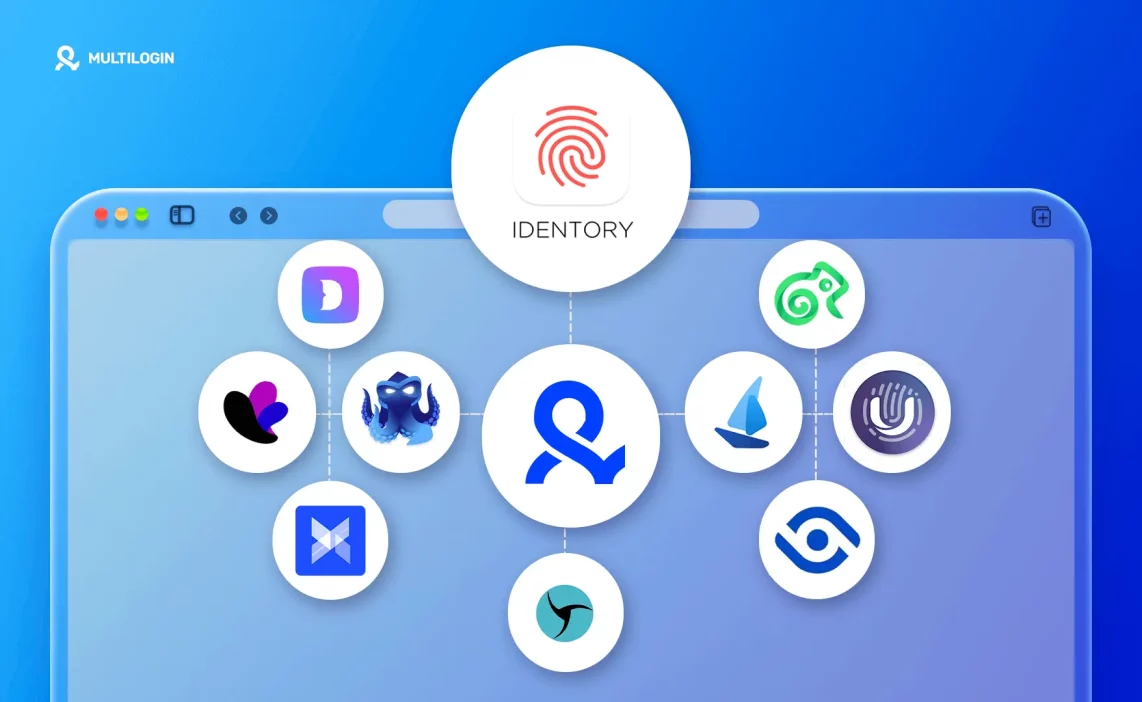In today’s complex online world, handling multiple accounts without getting banned is a constant uphill battle. Whether you’re an affiliate marketer, an e-commerce pro, or a social media manager, being able to keep your online identities separate is absolutely crucial. While Identory has been a player in this space, the ever-growing sophistication of antidetection tech means we need solutions that are more advanced and packed with features. This in-depth guide dives into the top 10 Identory alternatives for 2026, carefully comparing their strengths across five key areas: Fingerprinting, Built-in Proxies, Web Automation, Mobile Emulation, and Team Collaboration.
Why antidetect browsers are a must-have in 2026?
Websites these days use really clever browser fingerprinting techniques to spot and track users. They look at tons of data points—everything from your browser’s unique setup and operating system to your installed fonts and hardware details—to create a distinct digital signature. If you access multiple accounts from the same digital fingerprint, it immediately raises red flags, often leading to account suspensions, bans, or restricted access. Antidetect browsers are designed to fight back by creating isolated browsing environments, each with its own unique and legitimate digital fingerprint. This lets users manage lots of accounts securely and efficiently, making it look like genuine, separate people are using them, which ultimately protects their online activities.
Getting to know Identory
Identory is an antidetect browser, which creates unique fingerprints on the fly. As software installed directly on your computer, it gives you a certain level of control. Its main job is to spoof browser fingerprints to help with multi-accounting. However, as detection methods get smarter and smarter, simpler solutions like Identory can struggle, pushing users to look for more robust and constantly updated alternatives.
Top 10 Identory alternatives
So, you’ve got a good grasp of how antidetect browsers work and why they’re so useful. But with so many choices out there, how do you pick the right one for your needs? If you’re on the hunt for reliable alternatives, especially to other established solutions, we’ve got you covered. Here’s a detailed look at 10 top alternatives, diving into their practical applications and particular approaches without sugarcoating anything.
1. Multilogin
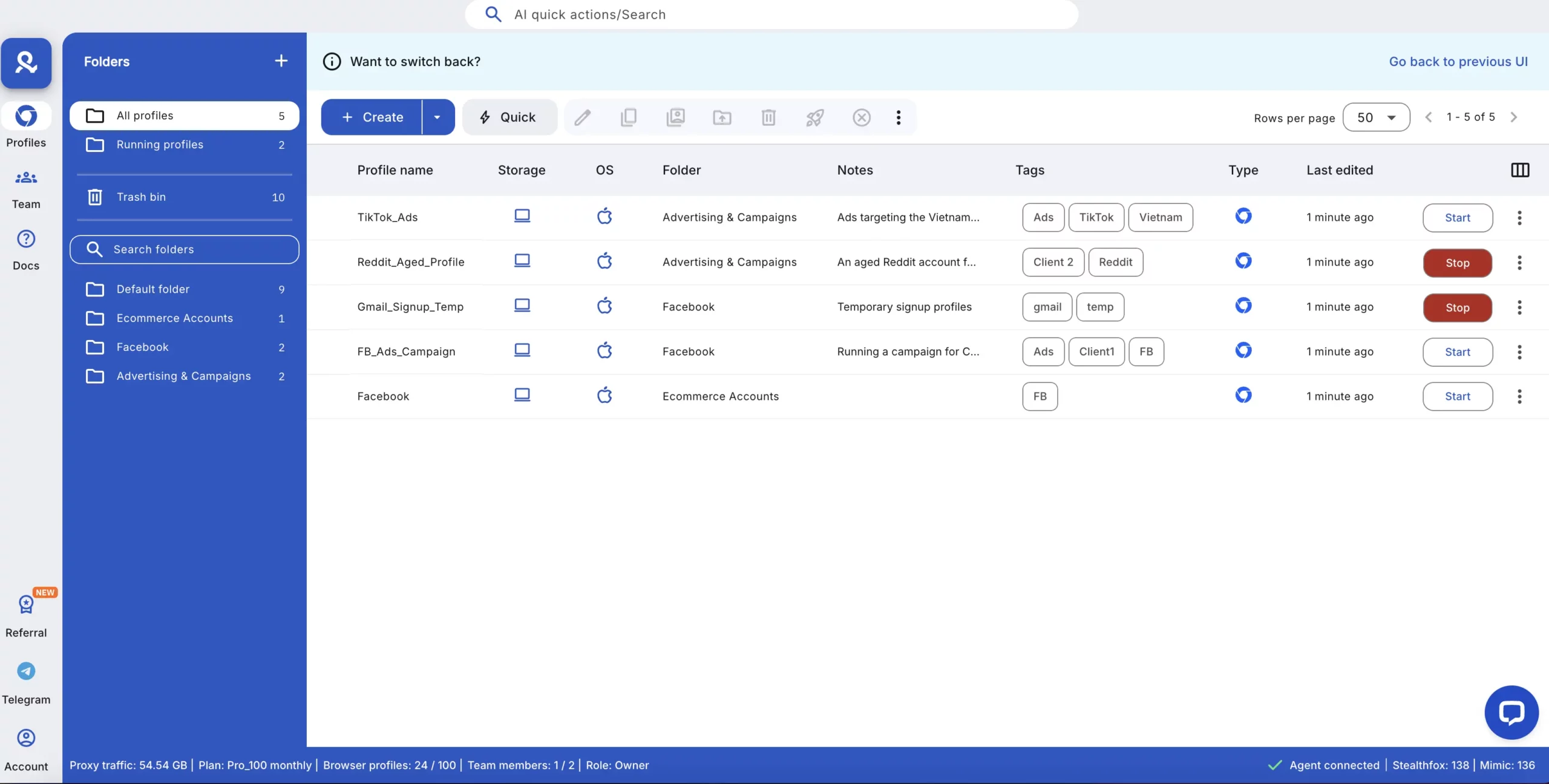
Multilogin truly stands as a gold standard in the antidetect browser world, consistently delivering unmatched performance, security, and innovation. It’s not just an alternative to Identory; it’s a huge leap forward in multi-accounting technology, offering a level of sophistication and reliability that’s simply unparalleled.
- Fingerprinting: Multilogin offers advanced, highly customizable fingerprinting technology. Every browser profile is meticulously crafted with a unique digital fingerprint, covering everything from canvas and WebGL to client hints, fonts, and more. This ensures that each profile looks like a distinct, legitimate user to even the most advanced detection systems, making it incredibly hard to track or link accounts.
- Built-in Proxies: Multilogin includes built-in proxies with access to over 30 million IPs across 150+ countries. This means you don’t need external proxy tools, which really streamlines your workflow. Besides it lets users seamlessly integrate and manage various proxy types directly within the browser, making IP rotation easy and ensuring top-notch anonymity for each profile.
- Web Automation: Multilogin offers comprehensive web automation capabilities through its powerful API. It integrates smoothly with popular automation frameworks like Selenium, Postman and Puppeteer, giving users the power to automate complex multi-account workflows at scale. This is vital for tasks such as creating accounts in bulk, scraping data, and handling repetitive social media interactions.
- Mobile Emulation: Multilogin provides advanced Android mobile emulation, allowing users to create browser profiles that perfectly mimic real mobile devices. This includes spoofing mobile-specific fingerprints, user agents, and screen resolutions, enabling users to manage accounts on mobile-optimized platforms without getting caught. This is a crucial feature for mobile marketing and app-based operations.
- Team Collaboration: Multilogin offers robust team collaboration features, letting multiple users work together on shared profiles and projects. It supports multi-user access with customizable roles and permissions, ensuring secure and efficient teamwork. This is incredibly valuable for agencies and larger organizations managing extensive multi-accounting operations.
Multilogin’s continuous innovation, combined with its strong focus on security and user anonymity, firmly establishes its position as the clear winner for professionals who demand nothing but the absolute best in antidetect browser technology.
2. Incogniton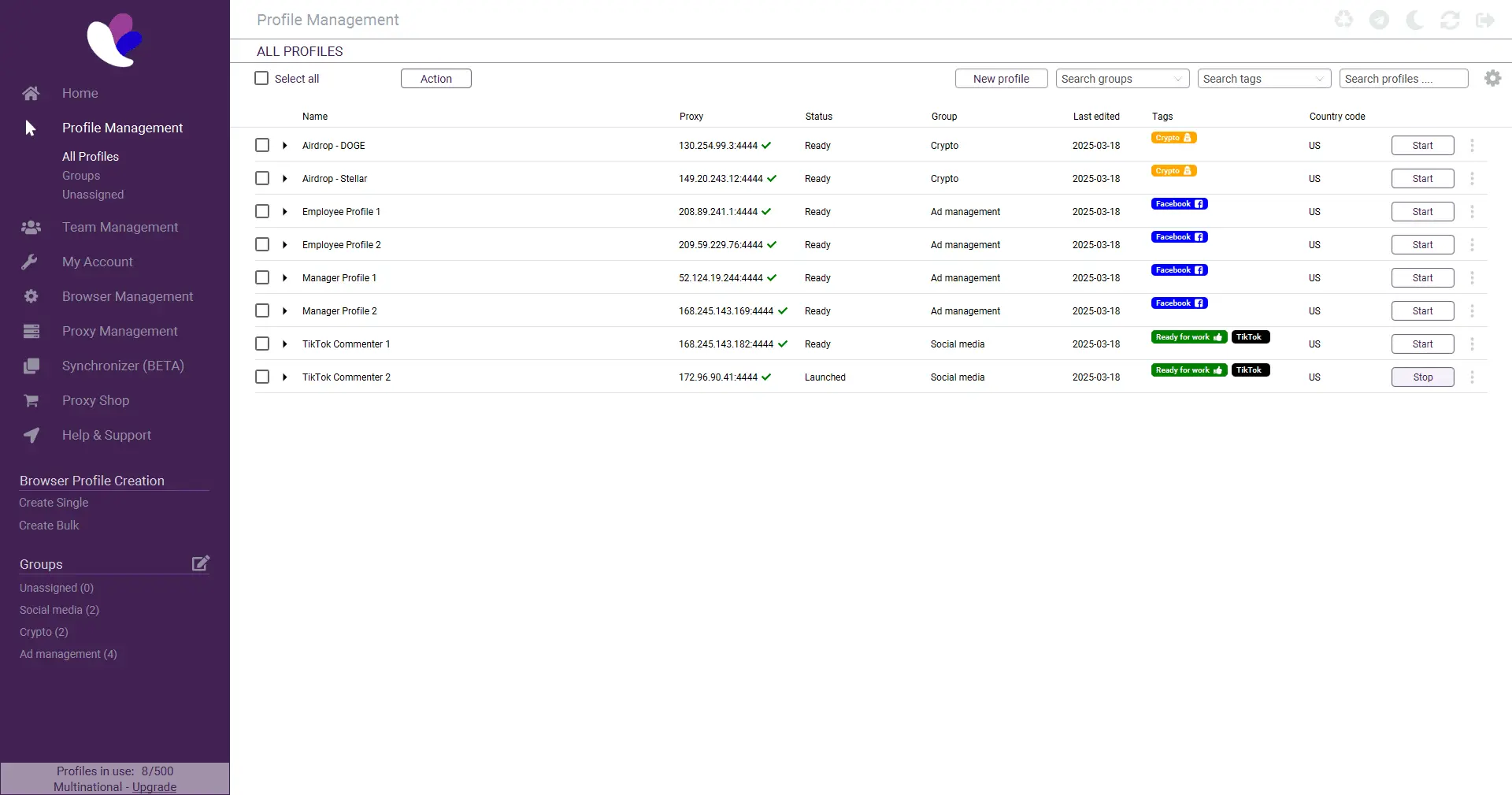
Incogniton positions itself as a reliable antidetect browser for secure multi-accounting, aiming to give users a good handle on their digital fingerprints. It’s often a go-to for digital marketing agencies, social media management, e-commerce, dropshipping, and traffic arbitrage.
- Fingerprinting: You get control and customization over browser profiles, with the goal of making each one appear unique and legitimate.
- Built-in Proxies: While it doesn’t come with its own built-in proxies, Incogniton is designed to integrate smoothly with various proxy types (HTTP, SOCKS5). Just remember, you’ll need to sort out your own proxy services separately, which adds an extra step to your setup.
- Web Automation: Incogniton offers API support and integrates with Selenium, which can definitely help you automate tasks and manage multiple accounts efficiently. However, if you’re not comfortable with scripting, getting the most out of these features might be a bit of a learning curve.
- Mobile Emulation: Yes, through specific browser profile settings, it allows for mimicking mobile devices.
- Team Collaboration: It includes team collaboration features, which can be quite handy for agencies and larger teams who need to work together on shared profiles.
3. Dolphin Anty
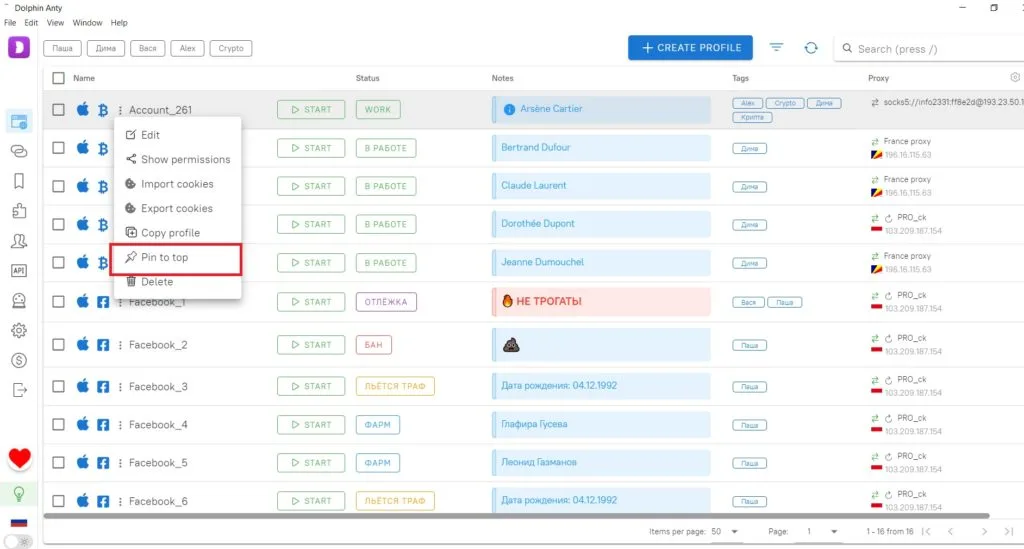
Dolphin Anty has really caught on, especially among affiliate marketers, and its focus on automation is a big reason why. It’s often seen as a good fit for affiliate marketing, traffic arbitrage, social media, and e-commerce.
- Fingerprinting: It aims to offer advanced masking to prevent detection, covering a decent range of parameters.
- Built-in Proxies: While it doesn’t have proxies built right in, it supports various proxy types (HTTP, HTTPS, SOCKS, SSH), giving you flexibility in managing IP addresses. You’ll still be responsible for finding and setting up your own proxy list.
- Web Automation: A notable aspect is its built-in tools, designed to streamline multi-accounting tasks. While these can be helpful, their overall scope and flexibility might not cover every single complex or highly customized automation scenario you could dream up.
- Mobile Emulation: Yes, through its profile settings, it allows for mimicking mobile environments.
- Team Collaboration: Its team collaboration features are designed to help manage shared profiles and workflows, which can be beneficial for multi-accounting operations.
4. AdsPower

- Fingerprinting: It aims to create separate browsing environments with unique native fingerprints and robust OS emulation.
- Built-in Proxies: Yes, it includes a manager that supports various types, which can simplify proxy integration.
- Web Automation: A key feature is its no-code Robotic Process Automation (RPA) and API, which can simplify repetitive tasks. While “no-code” is certainly convenient, the depth and customizability of its RPA might hit a ceiling for highly specific or intricate workflows.
- Mobile Emulation: Yes, it can emulate Android and iOS operating systems, aiming to be adaptable for diverse multi-accounting needs. Just keep in mind that the fidelity of this emulation might not always perfectly replicate every tiny detail of a real mobile device’s environment.
- Team Collaboration: It provides team collaboration features, including roles and permissions, which can facilitate teamwork on shared profiles.
5. Octo Browser
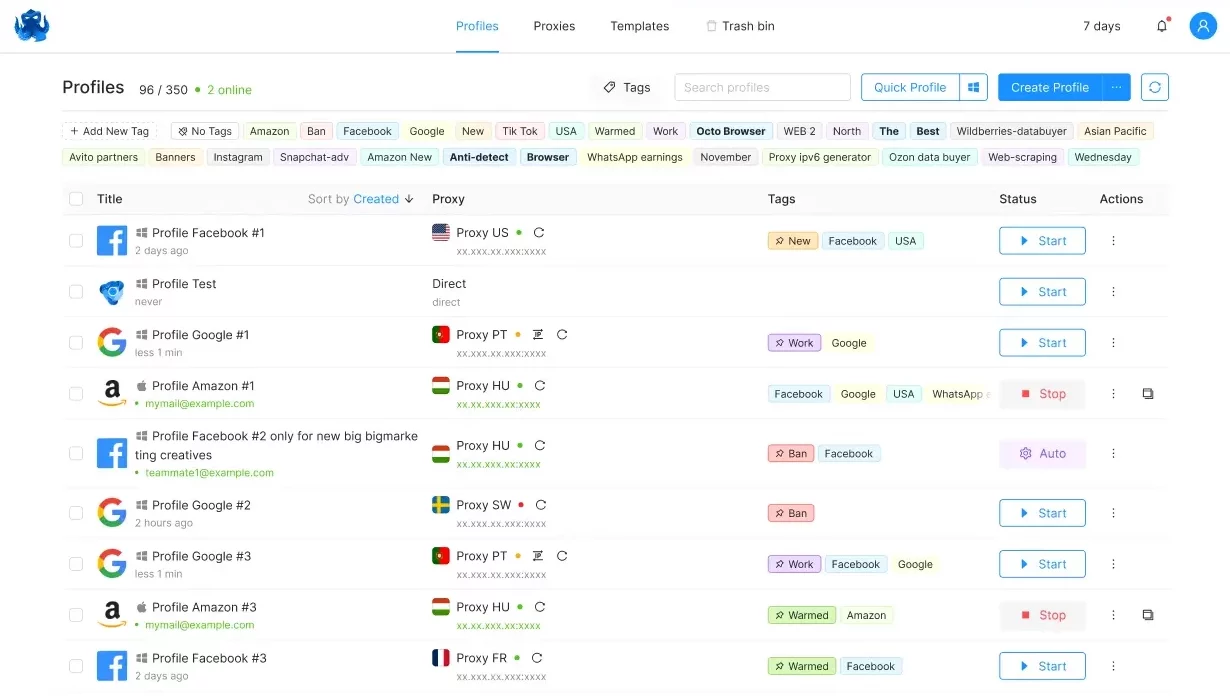
- Fingerprinting: It aims for high-quality digital fingerprinting spoofing, allowing for precise customization of digital identities.
- Built-in Proxies: No, it doesn’t include built-in proxies. However, it offers comprehensive proxy integration and management features, supporting various proxy types. This means you’ll need to handle acquiring and managing your proxy infrastructure independently.
- Web Automation: A powerful API for automation is available, which can allow users to automate complex tasks and integrate with other tools. However, if you’re not comfortable with coding, you might find its automation capabilities quite limited without external scripting.
- Mobile Emulation: It primarily relies on user-agent spoofing to simulate mobile environments. This approach might not offer the same depth of emulation as full operating system virtualization, which could be a factor for certain highly sensitive platforms.
- Team Collaboration: It includes team collaboration capabilities, which can assist in working efficiently on shared profiles for demanding tasks.
6. Kameleo
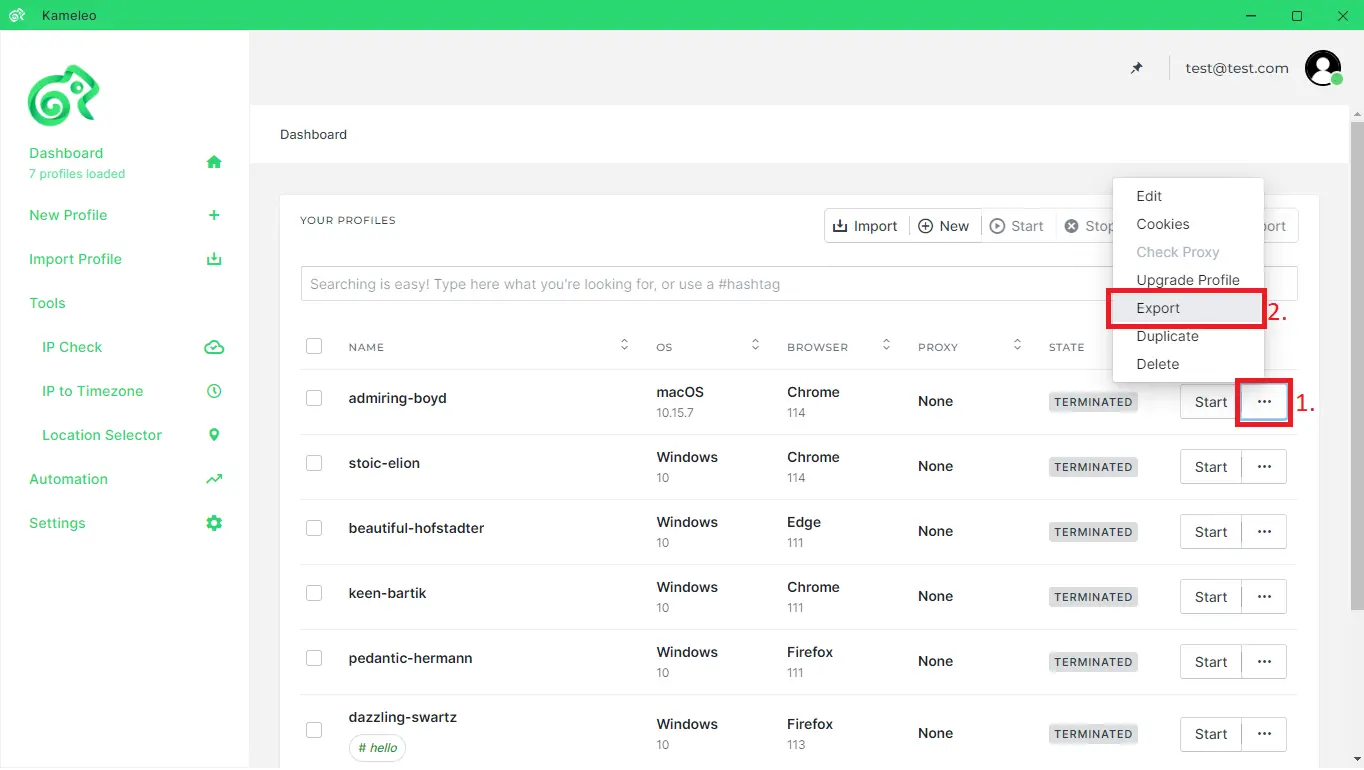
Kameleo is an antidetect browser that emphasizes highly customizable browser profiles and advanced canvas fingerprinting spoofing. It’s often chosen for web scraping, affiliate marketing, ad verification, and multi-accounting on platforms like Facebook, Amazon, and LinkedIn.
- Fingerprinting: It aims to provide highly customizable browser profiles and advanced canvas spoofing.
- Built-in Proxies: No, it doesn’t include built-in proxies. However, it provides comprehensive proxy integration, allowing you to configure specific proxy settings for each profile. You’ll need to source and manage your own proxies, which is an extra step.
- Web Automation: It offers features like Headless Mode and enhanced Network Log Tracing with Selenium, which can make scripting and testing efficient. These features are primarily beneficial for users who already have programming knowledge.
- Mobile Emulation: A unique aspect is its advanced mobile emulation capabilities specifically for Android, aiming to provide mobile anonymity without needing to root your device. Its primary focus is on Android emulation, which might limit its utility if you need comprehensive support for other mobile operating systems.
- Team Collaboration: Cloud Profiles, Groups, and Role-based Access are provided to promote teamwork.
7. Undetectable.io
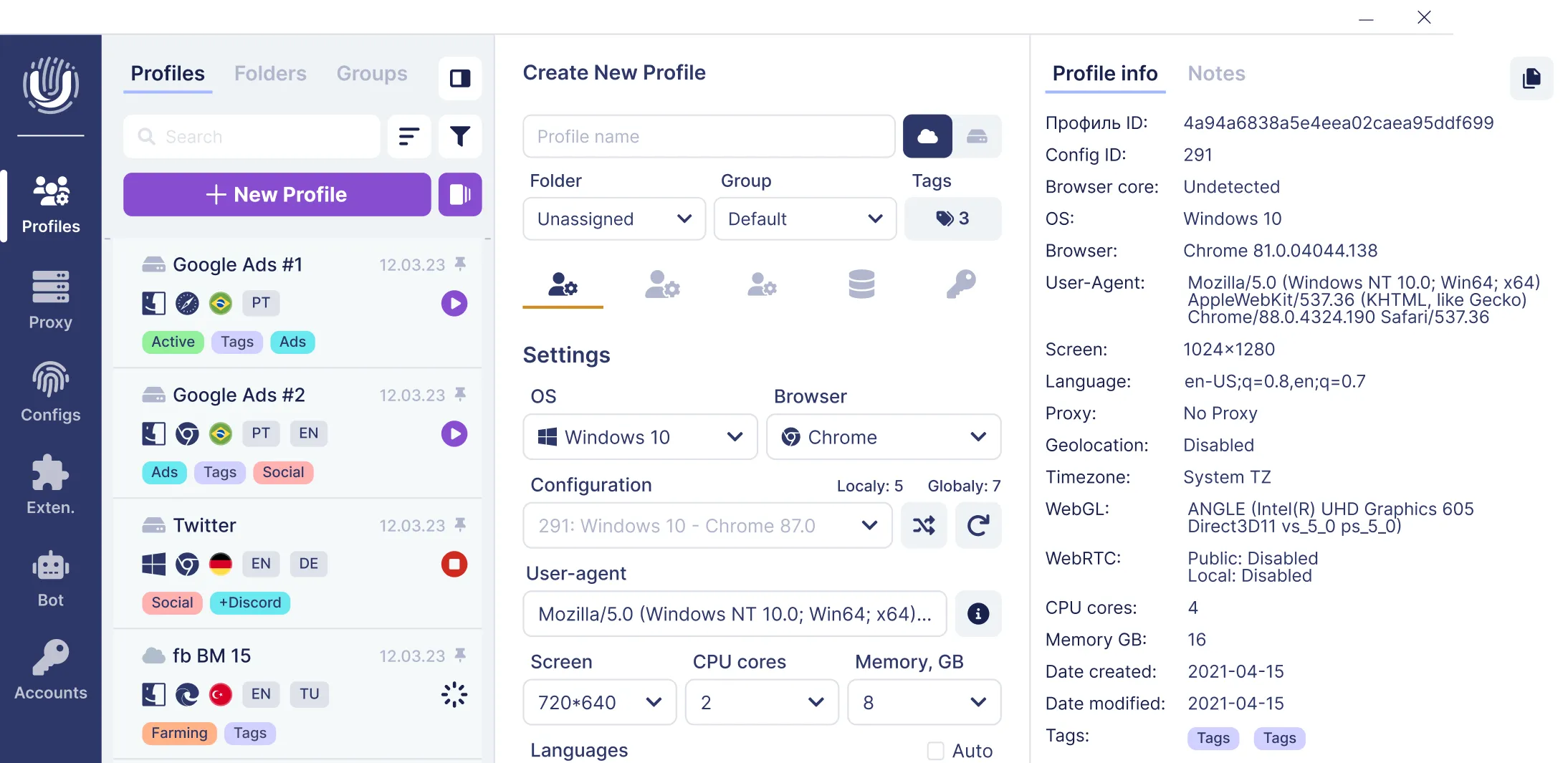
- Fingerprinting: It uses advanced spoofing that aims to mimic genuine browser profiles, designed to protect your online identity by modifying various computer parameters.
- Built-in Proxies: No, it doesn’t include built-in proxies. However, it includes proxy management features to assist with anonymity. You’ll still be responsible for acquiring and configuring your own proxy services.
- Web Automation: Undetectable.io supports API and bot creation, which can help streamline tasks and workflows. However, leveraging these capabilities typically requires programming skills.
- Mobile Emulation: It primarily relies on user-agent spoofing to simulate mobile environments. This method might not offer the same level of environmental replication as full OS emulation, which could be a factor for platforms with very stringent mobile detection.
- Team Collaboration: It facilitates team collaboration through profile sharing, offering flexibility for users managing many accounts in a team environment.
8. Linken Sphere
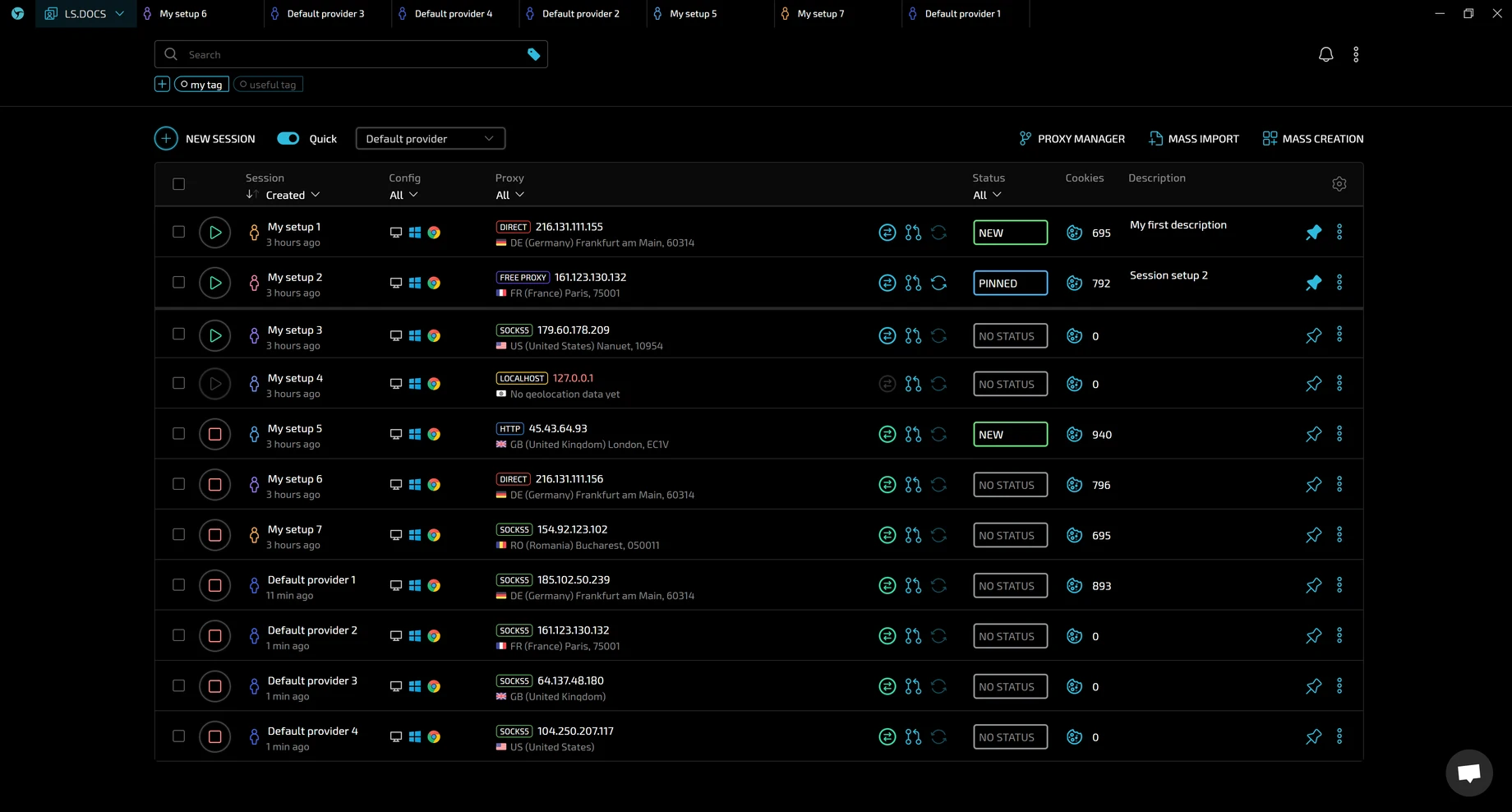
- Fingerprinting: At its heart lies the Advanced Engine (Sphere Engine), a technology designed to replace core fingerprinting mechanisms, aiming to make it difficult for websites to track you.
- Built-in Proxies: Yes, it supports various types for enhanced anonymity.
- Web Automation: It provides API and integrations, which can be useful for platforms like Facebook Ads. However, fully utilizing these features often requires a good grasp of technical concepts and scripting.
- Mobile Emulation: It aims to offer robust mobile emulation, allowing you to mimic mobile devices effectively.
- Team Collaboration: Its team collaboration features are described as more limited, focusing primarily on individual privacy and control. This suggests it might not offer the extensive, granular team management features you’d find in some other solutions designed for larger, more complex team structures.
9. Roxy Browser
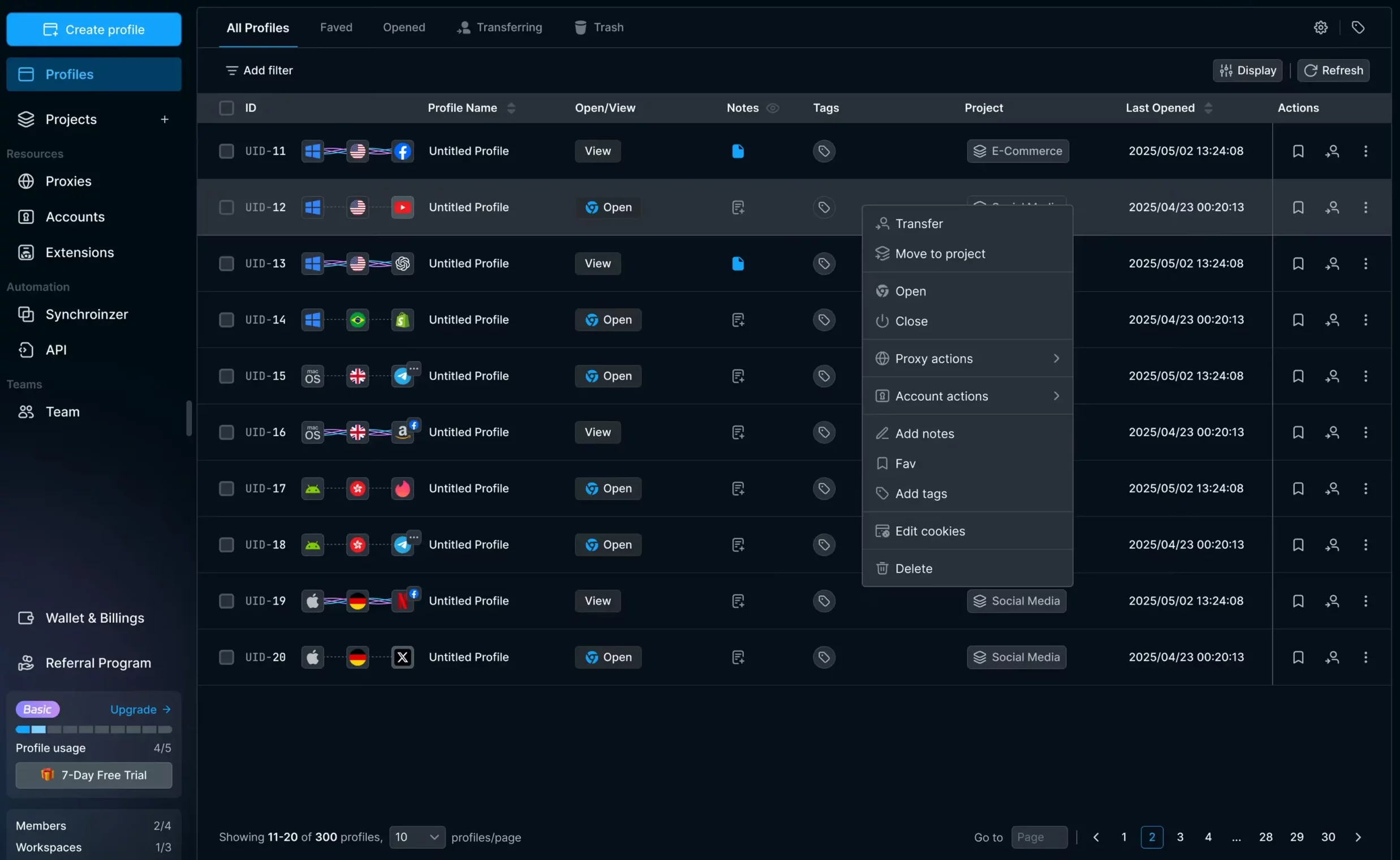
- Fingerprinting: It aims to excel at masking real browser fingerprints and generating unique digital identities for each profile.
- Built-in Proxies: Yes, it comes with IP tools and centralized management, aiming to simplify proxy integration.
- Web Automation: It supports API-driven automation and synchronized window actions, which can help streamline operations. If you’re looking for visual, no-code automation for complex workflows, this might be less intuitive, as it leans more on API interaction.
- Mobile Emulation: It primarily utilizes user-agent spoofing to simulate mobile environments. This approach might not provide the same depth of mobile environment replication as full OS emulation.
- Team Collaboration: Its team collaboration features are designed to be well-suited for shared workflows and projects.
10. Hidemium
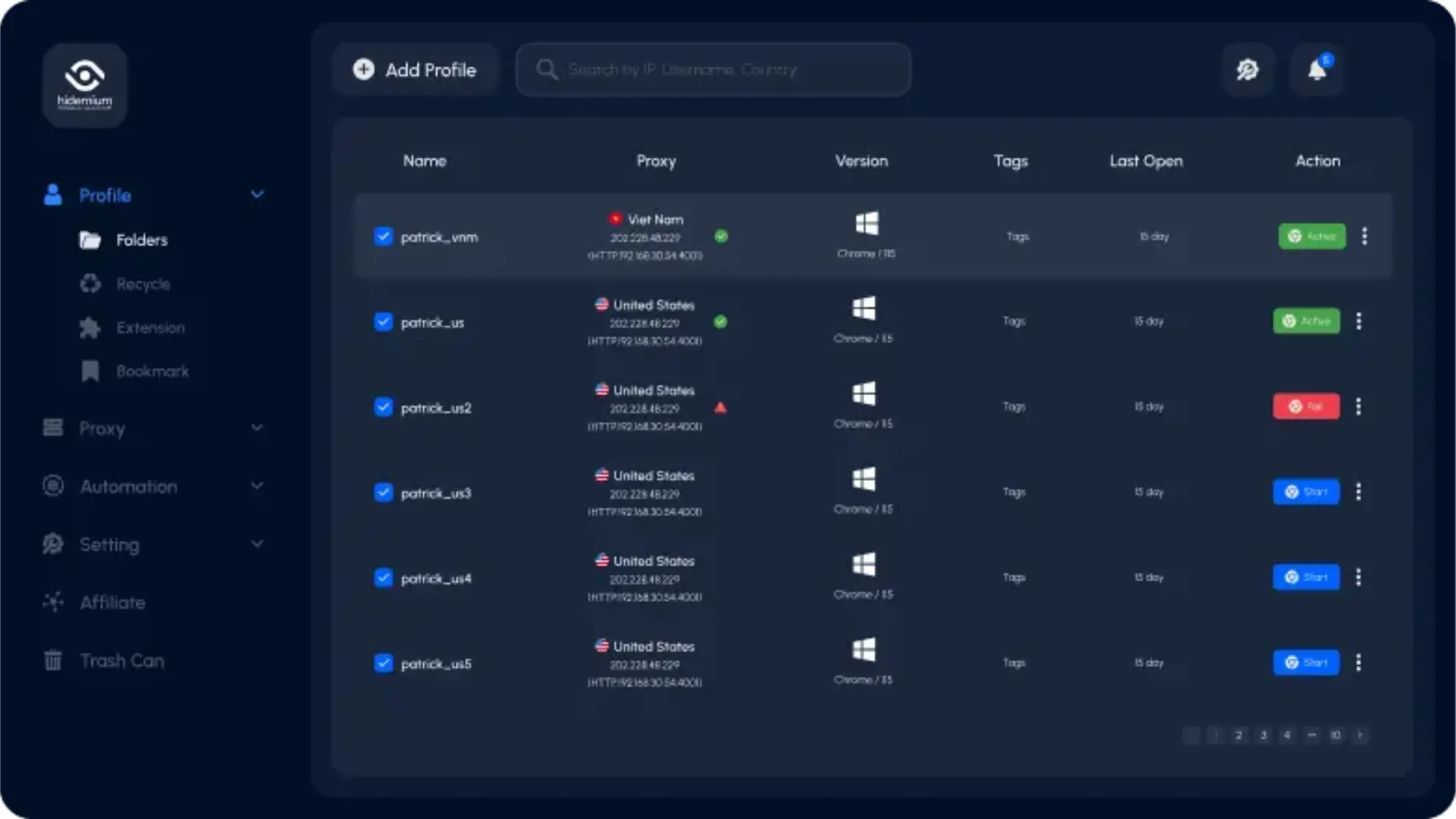
- Fingerprinting: Hidemium aims to dynamically alter browser fingerprint parameters, allowing you to operate with multiple profiles simultaneously, each with a distinct digital signature.
- Built-in Proxies: No, it doesn’t include built-in proxies. However, it integrates smoothly with various proxy services for IP address switching. You’ll need to provide your own proxy sources.
- Web Automation: It offers user-friendly no-code automation features and supports synchronized browser actions. While convenient, the scope of its no-code automation might be limited for highly complex or unique scenarios, potentially requiring more advanced solutions.
- Mobile Emulation: It primarily relies on user-agent spoofing to simulate mobile environments. This method might not offer the same level of environmental replication as full OS emulation.
- Team Collaboration: Its team collaboration features are described as more limited, focusing primarily on individual use and profile management. This suggests it might not be the best fit for large teams requiring extensive, granular access controls and collaborative tools.
Still using Identory?
See why users are switching to Multilogin. Compare Multilogin vs Identory Now
Final Verdict: Which Identory Alternative Is Right for You?
The antidetect browser market is a crucial battleground for anyone involved in multi-accounting, demanding solutions that are both powerful and adaptable. While Identory has served as a foundational tool, the landscape has definitely evolved, now offering a range of sophisticated alternatives.
Our thorough analysis across Fingerprinting, Built-in Proxies, Web Automation, Mobile Emulation, and Team Collaboration clearly places Multilogin as the industry leader. Its pioneering technology, unmatched profile isolation, and comprehensive feature set provide the most robust and reliable solution for professionals who demand the highest level of performance and undetectability.
However, the other alternatives we discussed—Incogniton, Dolphin Anty, AdsPower, Octo Browser, Kameleo, Undetectable.io, Linken Sphere, Roxy Browser, and Hideminium—each bring their own unique strengths and cater to diverse needs and budgets. Whether your top priority is advanced automation, specific mobile emulation, or extensive team collaboration, there’s a powerful antidetect browser out there tailored to your requirements.
Choosing the right antidetect browser is a strategic decision that directly impacts the success and security of your online operations. By understanding the nuances of these top alternatives, you can make an informed choice that empowers your digital activities and ensures you remain secure and undetected in the ever-evolving online world.
Frequently Asked Questions About Best Identory Alternatives
SiMultilogin does everything better. Its fingerprint spoofing is incredibly thorough—everything from canvas and WebGL to fonts and hardware specs is tinkered with so your profiles look completely unique. On top of that, you get instant access to over 30 million IP addresses across 190+ countries right inside the app, no extra proxy subscriptions needed. Whether you’re a beginner using the no-code macros or an expert coding against its powerful API, Multilogin handles it all seamlessly. It also offers full Android emulation and robust team features like role-based permissions and audit logs. In short, it’s the most reliable, all-in-one solution on the market.
Multilogin’s API is extremely powerful but best for users comfortable writing automation code. AdsPower’s no-code Robotic Process Automation (RPA) makes repetitive tasks easy without scripting. Incogniton and Undetectable.io offer API hooks, but their no-code features are more limited.
Yes—Multilogin and AdsPower lead in team collaboration, offering role-based access, shared profile libraries, and project folders. Incogniton, Dolphin Anty, Kameleo, and Roxy Browser provide collaboration features too, though with fewer permission-granularity options.
Unlike most of the browsers listed—Incogniton, Dolphin Anty, Octo Browser, Kameleo, Undetectable.io, and Hidemium—which force you to source and manage your own proxies, Multilogin offers built-in residential proxies, giving you instant access to millions of real IPs worldwide without any third-party setup.
